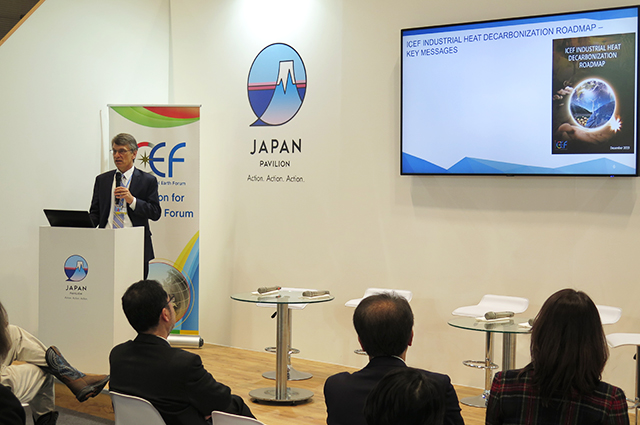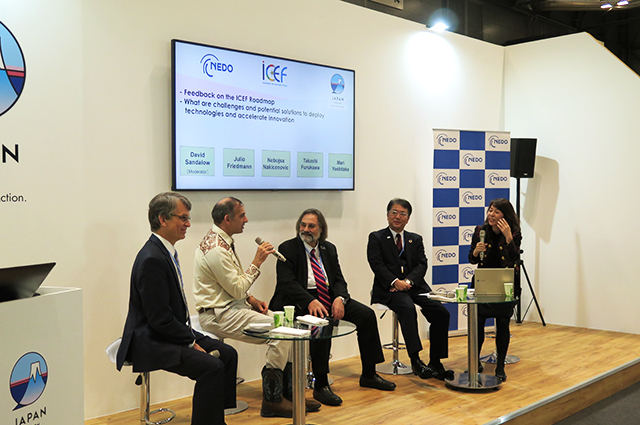Event Schedule - COP25 JAPAN PAVILION
2019.12.11
Leap Ahead to Decarbonization: The Launching Event of the Latest ICEF Roadmap on "Industrial Heat Decarbonization"
Organizer
- New Energy and Industrial Technology Development Organization (NEDO)
Event Overview
The Innovation for Cool Earth Forum (ICEF) is an international conference cohosted by METI and NEDO; The latest ICEF Roadmap on "Industrial Heat Decarbonization" will be presented at this seminar. Based on feedbacks from international agencies and industries, this seminar will consider challenges and potential solutions to deploy technologies and accelerate innovation from multiple viewpoints including finance.
Speaker
- Hiroshi Oikawa, New Energy and Industrial Technology Development Organization (NEDO), President
- David Sandalow, Columbia University, Inaugural Fellow, Center on Global Energy Policy
- S. Julio Friedmann, Columbia University, Senior Research Scholar, Center on Global Energy Policy
- Nebojsa Nakicenovic, The World in 2050 (TWI2050), Executive Director
- Takashi Furukawa, Sumitomo Chemical Co., Ltd., Deputy General Manager, Responsible Care Department
- Mari Yoshitaka, Mitsubishi UFJ Morgan Stanley Securities Co., Ltd., Chief Environmental and Social Strategist, Environmental Strategy Advisory Division
Event Materials
Event Summary
CO2 emissions from industrial heat production are roughly 10% of global CO2 emissions and more than the combined amount from cars and planes, yet to date there has been little research or data on low-carbon industrial heat production. Dr. Friedmann introduced that the roadmap examined hydrogen, biomass, electrification and CCUS as potential technologies to achieve industrial heat decarbonization, and evaluated the required capital, operating cost and carbon footprint of these technologies. He also explained the roadmap conducted case studies in cement, iron & steel and chemicals with the application of these technologies. Mr. Sandalow presented as necessary actions: 1) More researches on low-carbon industrial heat production and the cost reduction of these technologies are required to achieve industrial heat decarbonization; 2) Policy support is essential, particularly government procurement is important tool in building new market for low-carbon industrial heat technologies.
Mr. Sandalow, Dr. Friedmann, Dr. Nakicenovic, Dr. Furukawa and Ms. Yoshitaka discussed challenges and potential solutions to realize the recommendations of roadmap. In the discussion, it was stressed that policy support such as government procurement and subsidies is important at the initial stage of technology deployment. It was commented: 1) In capital-intensive process industries such as iron & steel and chemicals, it is impossible to obtain the prespecified performance when a new technology is applied afterwards because each equipment is designed and installed after coordinating some interrelated processes. So capital investment at the initial installation is important if new technologies are to be introduced; 2) While both knowledge of finance and understanding of technology are required when investing in new technologies, many investors lack the latter and it discourages investment. Following these comments, it was stressed that, to ensure private finance for the installation, it is important governments, industry and scientists work together to show a future vision in which relevant industry applies low-carbon industrial heat technologies.



Other Events On This Day
Progress of NDC and City Climate Action (Locally Determined Contributions) in Asia
National Institute of Environmental Studies (NIES)
International Coordination in Efforts of Climate Change Response Measures
Research Institute of Innovative Technology for the Earth (RITE)
Innovative approaches to attain UN SDGs and the Paris Agreement with climate change mitigation and economic growth
Global Industrial and Social Progress Research Institute
Leap ahead to Decarbonization: The launching event of the latest ICEF Roadmap on "Industrial Heat Decarbonization"
New Energy and Industrial Technology Development Organization (NEDO)